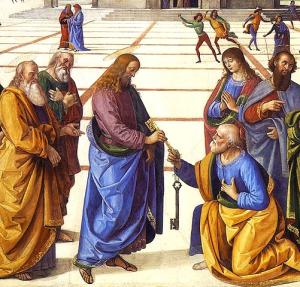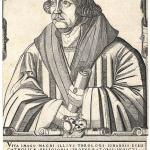“Please Hit ‘Subscribe’”! If you have received benefit from this or any of my other 4,600+ articles, please follow this blog by signing up (with your email address) on the sidebar to the right (you may have to scroll down a bit), above where there is an icon bar, “Sign Me Up!”: to receive notice when I post a new blog article. This is the equivalent of subscribing to a YouTube channel. Please also consider following me on Twitter / X and purchasing one or more of my 55 books. All of this helps me get more exposure, and (however little!) more income for my full-time apologetics work. Thanks so much and happy reading!
***
Johann Eck (1486-1543) was a German Catholic theologian, who was arguably one of Martin Luther’s two most important and formidable debate opponents, along with Erasmus (I’ve compiled several of his devastating replies to Luther as well). He was ordained as a priest in 1508 and in 1510 was installed as a professor of theology at the University of Ingolstadt in Bavaria: which lasted for thirty years. He mastered both Greek and Hebrew and had a prodigious memory, boundless energy, and very considerable debating skills. He famously engaged Luther for eighteen days in the Leipzig Disputation of July 1519.
Eck’s argumentation might be said to be one of the quintessential examples of the Catholic theological and polemical response to the Protestant Revolt up to the opening of the Council of Trent in 1545. This is one of many excerpts from his best-known and principal volume, Enchiridion of Commonplaces Against Luther and Other Enemies of the Church. It first appeared in 1529 and eventually went through 91 editions. I will be using a later edition from 1541 (translated by Ford Lewis Battles, Grand Rapids, Michigan: Baker Book House, 1979; now in the public domain).
Eck’s words will be in black; my interjections in blue, and citations from Luther and other famous Protestants in green. I use RSV for scriptural citations.
***
[On Mt 16:17 ff.] It is clear how he meant to designate the person of Peter, for he set forth his old name, Simon, his new name, Peter, the name of his father Bar-Jonah and properly shows this. “You are, and upon this rock,” Jerome explains: “That is, upon you, and I will give you the keys,” etc. And through these words the holy fathers attest that the primacy was promised to Peter, and upon Peter the Church was to be built.
Cyprian, Epist 68.8, to Pupian, and 54.7, to Cornelius.
Origen, On Matthew, Hom. 6.
Jerome, Against the Pelagians, 1 and On Matthew, 16.
Ambrose, Sermon 47.
Augustine, Against the Epistle of Donatus.
Chrysostom, On Matthew.
[On Jn 21:15] To Peter alone as the prince of the Apostles in the presence of the other Apostles, He committed the flock: for “to [pastor]” in the Scriptures means “to rule,” and in Ez 34:2; Isaiah 44:28; 56:11; Jer 22:22; Jer 23:1; Ps 72:70f, kings are called “shepherds.” This is true in Hebrew and in Greek.
That the primacy was given to Peter through these words, Cyprian, De Simplicitate Praelatorum, attests. Jerome in his Discourse on Peter to Eustochium, Ambrose in his Sermon on Penance, and on the Faith of Peter. Chrysostom On John, Hom. 8, on Repentance, Augustine, Questions on the New and Old Testaments, Qu. 75.
Peter’s primacy is proved from many other passages of Scripture Lk 22:31f: “Simon, behold Satan has desired to have you, that he may sift you as wheat; but I have prayed for you, that your faith may not fail, and you, being once converted, may confirm your brethren.” Note that He prays for Peter more than the rest, and petitions two things: indefectibility of faith and power to confirm the faithful. . . .
Mt 10:2, Mk 3:6, Lk 6:14, where the appointment of the Apostles is described: by all Peter is named as head, first, that Jerome and Chrysostom reckoned on behalf of his primacy on the basis of Jn 21 that Peter alone came to Christ across the waters of the sea.
This is the sign of a singular pontificate, says Bernard, On Consideration, to Eugenius. And if to the other disciples it is commanded that they let down their nets, only to Peter is it said “launch out into the deep” [Lk 3:4]. So ponders Ambrose.
We have now heard from the holy fathers: all attribute the primacy to Peter, first promised by the Lord, then after the resurrection set forth over the whole Church. Let some thing be added to these prior proofs.
Dionysius, On the Divine Names, ch. 3.
Athanasius in his Epistles to Marcus, Liberius, and Felix II, in which he abundantly proves the primacy of the Pope.
Eusebius H.E. [History of the Church], 2.14. Augustine, On John’s Gospel, Tract. 56, Against the Donatists, 2, etc. Lactantius, Divine Institutes 7.
Reason persuades that there was a high priest under the old Law, whose authority was heard [Dt 17 [:9]. And the monarchical rule is
best: and such is the order in the Church Triumphant.
[Deuteronomy 17:9-12 and coming to the Levitical priests, and to the judge who is in office in those days, you shall consult them, and they shall declare to you the decision. [10] Then you shall do according to what they declare to you from that place which the LORD will choose; and you shall be careful to do according to all that they direct you; [11] according to the instructions which they give you, and according to the decision which they pronounce to you, you shall do; you shall not turn aside from the verdict which they declare to you, either to the right hand or to the left. [12] The man who acts presumptuously, by not obeying the priest who stands to minister there before the LORD your God, or the judge, that man shall die; so you shall purge the evil from Israel.]
This is beautifully confirmed by Gregory Nazianzus: Moses in doubtful times provided for the synagogue [Dt 17: 10ff]. Why should not Christ have provided for His bride the Church? . . .
[Objection] And since the Church was built upon a rock, but his rock was Christ [1 Cor 10:4] it cannot be referred to Peter, “… and other foundation can no one lay; save that which has been laid” [1 Cor 3:11]. . . .
[Reply] Even if Christ is the chief rock and primary foundation, yet He has vicars and substitutes, secondary rocks. For alongside Paul’s statement that Christ alone is the foundation stands the statement of John [Rev 21:14]: “And the wall of the city had twelve foundations, and in them, the twelve names of the twelve apostles, and of the Lamb.” . . .
[Objection] The primitive Church of the Apostles would not have been a Church, since Peter, 18 years after Christ had suffered, was still in Jerusalem. Where then was the Roman Church? . . .
[Reply] Luther is mistaken that Peter came so late to Rome: for he was five years in Pontus, and seven years at Antioch in Asia; afterwards he migrated to Rome: although in the 18th year he came from Rome to Jerusalem to the Council. Now, nothing applies to the matter. For Peter was the supreme pontiff wherever he was, although by the revelation of the Spirit, as St. Marcellus the martyr says, he chose a see for himself at Rome. Therefore Peter was for a time supreme bishop before he became Bishop of Rome. . . .
[Objection] Peter never was at Rome. . . .
[Reply] The very ancient man Hegesippus, who came to Rome under Anicetus in the year of our Lord 160, wrote in Book 3 of On the Destruction of Jerusalem, how Nero sought a pretext for killing the Apostles, and when the command was given that the Apostles be seized, Peter was asked that he give himself over to another.
Dionysius Bishop of the Corinthians, living at Rome A.D. 50, says: “You having admonition from Peter and Paul, have joined the planting (plantation) of the Roman Church.” Also both men arriving and teaching in this city at the same time, were crowned too with martyrdom in like manner at one and the same time. A certain writer named Gaius under Pope Zephyrinus attests the same thing.
Saint Ignatius, a disciple of John the Evangelist, writes to the Tarsians: “What of the fact that Peter was crucified? That Paul and James were cut down with swords? That John was banished to Patmos?” And in his letter to the Romans.: “Not just as Peter and Paul do I bid you: for they were Apostles of Jesus Christ, but I am the least.” Irenaeus, bishop of Lyon, Against Heretics, 3.1., says as follows: “Matthew gave the Scripture of the Gospel to the Hebrews in their own language, while Peter and Paul proclaimed the Gospel at Rome, and founded the Church.”
And Ch. 3: “By the two most glorious apostles Peter and Paul, the Churches of Rome were founded and established.” Tertullian, living A.D. 150, wrote in Against Marcion, 3: “To the Romans, Peter and Paul left the Gospel with the seal of their own blood.” And On the Prescription of Heretics, 36, speaking of Rome, he adds: “Where Peter is brought into equality with the Lord’s passion.”
Eusebius of Caesarea, [History of the Church], 2: says: “In those times of Claudius, by the mercy of divine providence, he led Peter, the most approved of all the Apostles, and the greatest in magnificence of faith and merit of virtue, the prime prince, to the city of Rome.”
And in the book De Temporibus: . . . “Peter, a Galilean by birth, the first pontiff of the Christians, after he had first founded the Church of Antioch, proceeded to Rome, where preaching the Gospel he persevered for 25 years as bishop of the same city.” . . .
Jerome, On Famous Men, c.1; “Simon Peter, son of John of the province of Galilee, of the village of Bethsaida, brother of Andrew the Apostle, and prince of the Apostles, after his episcopate of the Church of Antioch, and preaching of the dispersion of those who had believed in the circumcision in Pontus, Galatia, Cappodocia, Asia, and Bythynia, in the second year of the Emperor Claudius hastened to Rome to overcome Simon Magus; there he occupied the episcopal see for 25 years.” Dionysius the Areopagite, St. Paul’s disciple, attested the same to his fellow-disciple Timothy, concerning the passing of the Apostles.
Linus the next pope after Peter, wrote to the Easterns in behalf of the martyrdom of Peter in the city.
Ambrose in Sermon 67, says: “Let us not think it came to pass without cause, that on one day, in one place they bore the sentence of one tyrant, suffered on one day, so that together they came to Christ, in one place, lest Rome should be deprived of either one.” etc. And further on: “In the city of Rome, which obtained the chief position and headship of the nations,” he speaks of Peter and Paul. Papias of Jerusalem, the hearer of John the Evangelist, attests that Peter wrote his first canonical epistle at Rome. . . .
[Objection] How could Peter have been the rock, when in Mt 16:18f Christ said: “Get behind me, Satan” [?] . . .
[Reply] he had not yet received the keys, had not yet been confirmed, and had not yet the fulness of the spirit come upon him. Therefore he was not yet the rock, but after the resurrection Christ founded the Church upon him, as Jerome expressly states in his Commentary on Matthew, at that verse. Lastly, Chrysostom and Hilary would not apply the name of Satan to Peter, but to the devil, the supporter of this advice. [I slightly modified the awkward overly literal translation] . . .
***
*
Practical Matters: Perhaps some of my 4,600+ free online articles (the most comprehensive “one-stop” Catholic apologetics site) or fifty-five books have helped you (by God’s grace) to decide to become Catholic or to return to the Church, or better understand some doctrines and why we believe them.
Or you may believe my work is worthy to support for the purpose of apologetics and evangelism in general. If so, please seriously consider a much-needed financial contribution. I’m always in need of more funds: especially monthly support. “The laborer is worthy of his wages” (1 Tim 5:18, NKJV). 1 December 2021 was my 20th anniversary as a full-time Catholic apologist, and February 2022 marked the 25th anniversary of my blog.
PayPal donations are the easiest: just send to my email address: [email protected]. Here’s also a second page to get to PayPal. You’ll see the term “Catholic Used Book Service”, which is my old side-business. To learn about the different methods of contributing (including Zelle), see my page: About Catholic Apologist Dave Armstrong / Donation Information. Thanks a million from the bottom of my heart!
*
***
*
Photo credit: Christ Handing the Keys to St. Peter (c. 1482) by Pietro Perugino (1448-1523) [public domain / Wikimedia Commons]
Summary: One of a series of posts documenting the Catholic apologetics efforts of Johann Eck (1486-1543) against various Protestants. This entry addresses the papacy.














